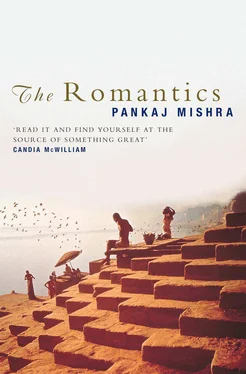Pankaj Mishra - The Romantics
Здесь есть возможность читать онлайн «Pankaj Mishra - The Romantics» весь текст электронной книги совершенно бесплатно (целиком полную версию без сокращений). В некоторых случаях можно слушать аудио, скачать через торрент в формате fb2 и присутствует краткое содержание. Год выпуска: 2001, Издательство: Anchor Books, Жанр: Современная проза, на английском языке. Описание произведения, (предисловие) а так же отзывы посетителей доступны на портале библиотеки ЛибКат.
- Название:The Romantics
- Автор:
- Издательство:Anchor Books
- Жанр:
- Год:2001
- ISBN:нет данных
- Рейтинг книги:4 / 5. Голосов: 1
-
Избранное:Добавить в избранное
- Отзывы:
-
Ваша оценка:
- 80
- 1
- 2
- 3
- 4
- 5
The Romantics: краткое содержание, описание и аннотация
Предлагаем к чтению аннотацию, описание, краткое содержание или предисловие (зависит от того, что написал сам автор книги «The Romantics»). Если вы не нашли необходимую информацию о книге — напишите в комментариях, мы постараемся отыскать её.
The Romantics — читать онлайн бесплатно полную книгу (весь текст) целиком
Ниже представлен текст книги, разбитый по страницам. Система сохранения места последней прочитанной страницы, позволяет с удобством читать онлайн бесплатно книгу «The Romantics», без необходимости каждый раз заново искать на чём Вы остановились. Поставьте закладку, и сможете в любой момент перейти на страницу, на которой закончили чтение.
Интервал:
Закладка:
There wasn’t much I could tell her. These things couldn’t be explained. Just as my father, when he announced to me his decision to move to an ashram in Pondicherry after my mother’s death, hadn’t needed to explain anything. His decision was in accordance with an old rite of passage: the withdrawal from the active world in late middle age, the retreat into the self. We instinctively understood these ancestral obligations; we rarely ever questioned them and never asked for explanations. It had been so when, after an indifferent education in a number of nondescript small-town schools across India, the time came for me to go to university. Three generations of my mother’s family had gone to the university in Allahabad, a sister city of Benares, and it was to Allahabad that I had gone.
On the face of it, it wasn’t a bad choice. Set up in 1887, the university was once known as the Oxford of the East. To seekers of jobs and careers in the colonial dispensation it offered an attractive pedigree. But unbeknown to those of us who still set store by its old reputation, the university had suffered a steep decline in the years since independence. Anarchy reigned behind the still impressive façade of its domes and towers. Academic sessions were in total disarray: examinations due in April were more likely to be held in December, if at all. Everyone was locked in conflict: students against students, teachers against teachers, teachers against students, students against the management, teachers against the management, students against the police. Often these conflicts turned violent. Students shot at each other on the streets with country-made revolvers. Late at night, you were hurtled out of your sleep by the sound of a crude bomb going off somewhere in the vicinity. In the morning, you read the details in the crime pages of the local Hindi papers: political rivalry, ambush, instant death, investigation ordered, no arrests so far.
Miss West appeared shocked by the few things I told her. ‘How extraordinary!’ she exclaimed. ‘How absolutely awful! You must have been very brave to have survived all that.’ Then, in a calmer tone, she added, ‘You know I never went to university. My father belonged to a generation where people didn’t bother with educating their daughters.’
I thought this odd. Prejudices against female education were a feature of poor societies; I didn’t associate them with England. Could it be that her father couldn’t afford to send her to university? I wasn’t sure, and didn’t think it was the sort of question I could ask. Then she mentioned the party and confused me further.
I was nineteen years old but hadn’t ever been to a ‘party’. The word itself brought to mind noisy, half-naked revellers; it suggested the kind of empty frivolity and moral laxity of which I had been brought up to disapprove. My view of Miss West altered; I now saw her as an organizer of parties.
At the same time I felt myself corralled into her preparations. I bought the welcoming garlands for the musicians who Miss West said would perform after dinner; I went out to the bazaar and looked at the various kinds of Bengali sweets available, and, overcoming an innate aversion to intoxicants and stimulants, I even arranged for the bhang-flavoured thandai that I’d heard was the staple item at such occasions in Benares.
Miss West fretted over her guest list. After five years in the city, she knew a great many people. In the end, she invited only a handful of them. ‘Can’t possibly have them all over. It’s frightfully small, this place,’ she said, her pencil stabbing at the list of scribbled names. ‘Mrs Pandey might object to that many people trooping in and out of her house.’
Mrs Pandey and Shyam, her retainer, did look askance at our preparations. Sitting close together on low wooden stools, they would look up from a brass plate of finely chopped tomatoes, ginger and garlic to exchange muttered remarks as people came up and down the stairs carrying logs of rolled-up dhurries and bolsters. The general drift of these remarks — some of which I overheard — was that Miss West’s party was a poor approximation of similar events in their own past. One evening before the party when I had gone to eat with them — as I did each alternate day, sitting cross-legged on the floor in their dark, sooty, windowless kitchen, awkwardly inhaling smoke from the chulha fire over which Shyam rotated slowly inflating chapatis with a pair of rusty iron tongs — Mrs Pandey spoke pointedly of the splendour of the musical soirées the Maharaja of Benares used to hold at one time. Her own father, a famous sitar player, she said, was an exalted guest at such gatherings. What about Panditji? I asked, referring to her husband downstairs. She looked scornfully at me. What about him? she seemed to say. I was soon to know that this was an obsessive theme with her: how the grandeur of her family connections had been fatally undermined by her marriage to Panditji, a penniless musician who, when he first arrived at her father’s mansion as a student, Mrs Pandey would claim, owned nothing other than the clothes he had on his undernourished body.
*
On the evening of the party, Mrs Pandey ate early and then disappeared into her room. Panditji was as usual oblivious to the goings-on in his house. Only Shyam showed some interest. He lived the neutered life of a feudal retainer, aware of nothing except his mistress’s wishes, and he rarely spoke a word apart from a clichéd proverb in Hindi he would repeat, without regard to context, as he fanned the chulha fire: ‘Greed,’ he would mumble, ‘is the biggest evil. It eats away man, destroys families, sunders son from parents, husband from wife. .’ This evening, he squatted on the floor, scrubbing brass dishes with coal ash and water, his jaw jutting out as he slowly chewed on his tobacco, and stared disconcertingly at the guests as they walked up to the roof.
The musicians had been the first to arrive, wearing long embroidered kurtas and shawls that had been drenched in attar. Miss West, who wore an expensive-looking chocolate-brown dress of some soft shiny material and was to receive compliments for it from everyone except myself, made the introductions. ‘This is Samar,’ she said. ‘He wants to read everything.’ That was to be my role with her: the autodidact, the fanatical reader who wanted to read everything. She seemed to take a somewhat proprietory stance towards the sitar player among the musicians, a thin young man with tense sharp features and long flowing hair, red betel juice around the corners of his mouth. His name was Anand. ‘Are you treating Catherine well?’ Miss West asked him, and he replied in a tone of mock complaint and with a heavy Indian accent: ‘But, Miss West, she must learn to cook.’ And Miss West, still bantering, said, ‘You sexist Indian men, you never change, do you?’
Mark was the next to arrive. He was studying ‘alternative’ medicine in Benares. Miss West had shown me an essay he had written for an American magazine on the superiority of Ayurvedic medicine; it was the kind of thing Miss West seemed to like reading, anything that proposed a radical assault on received knowledge. The essay was full of technical terms I couldn’t follow. But I was struck by the biographical note, which mentioned the various careers Mark had pursued at different stages in his life: poet, dishwasher, painter, Tibetan Buddhist, carpenter and traveller through such remote lands as Ecuador and Congo.
On that first sighting, Mark’s craggy, broad-shouldered handsomeness, enveloped in a long Pathan suit, seemed to match perfectly the years of hard experience his biography hinted at. He was accompanied by two women. One of them — with close-cropped hair and glasses on her round, plump-cheeked face — was called Sarah. She was German and a practising Buddhist, Miss West had told me, and I had wondered about the word ‘practising’: it seemed to me superfluous for someone who had gone to the trouble of converting to Buddhism from the faith she was born in. But I didn’t raise the point with Miss West. I had seen Sarah before on the ghats — Miss West had pointed her out to me — and she had appeared serious enough about her new faith. She sat in the same spot every day, a step away from the waterline, and in the same contemplative posture: cross-legged, arms held straight in front, hands resting on her knees, palms facing upward, eyes fixed on some distant invisible object out on the river. Nothing seemed to distract her: neither the banter of the boys playing badminton on a chalk-marked court, nor the late-evening bathers and the boatloads of tourists, who would stare curiously at the woman in semi-Indian attire sitting all by herself on the ghats.
Читать дальшеИнтервал:
Закладка:
Похожие книги на «The Romantics»
Представляем Вашему вниманию похожие книги на «The Romantics» списком для выбора. Мы отобрали схожую по названию и смыслу литературу в надежде предоставить читателям больше вариантов отыскать новые, интересные, ещё непрочитанные произведения.
Обсуждение, отзывы о книге «The Romantics» и просто собственные мнения читателей. Оставьте ваши комментарии, напишите, что Вы думаете о произведении, его смысле или главных героях. Укажите что конкретно понравилось, а что нет, и почему Вы так считаете.












